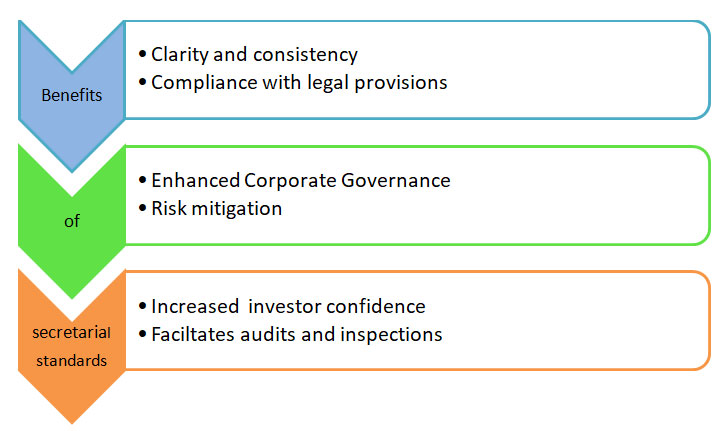Understanding the Importance of Secretarial Standard 1
Secretarial Standard 1 is issued by the Institute of Company Secretaries of India (ICSI) under the Companies Act, 2013. It provides guidelines and the principles for maintaining and updating the registers, records and minutes as per the Companies Act, 2013. The purpose of Secretarial Standard is to establish uniformity in the secretarial practices and procedures followed by the company.
SS-1 covers different secretarial practices like maintenance of statutory registers, records and minutes. It helps in the maintenance of Register of Members, Register of Directors, Key Managerial Personnel , Register of Debenture holders etc. SS-1 specifies the necessary details to be included in minutes and the retention period for preserving the minutes.
Companies need to comply with SS-1 as per the provisions of Companies Act, 2013. Company Secretary is responsible for ensuring that the secretarial functions are complied with as per the guidelines provided in SS-1.
Benefits of Secretarial Standard 1 in Corporate Governance
- Clarity and consistency: Secretarial Standard 1 provide clear guidelines for different company related activities providing consistency in decision making process.
- Compliance with legal provisions: Secretarial Standard 1 help companies comply with all the legal compliances as per Companies Act, 2013.It helps companies to avoid penalty or any kind of legal issues arising from non compliances.
- Enhanced Corporate Governance: Secretarial Standard 1 aims at providing good corporate governance. Itemphasize on ensuring transparency, accountability and integrity in decision making process.
- Risk mitigation: Companies face various risks in their operations including legal, financial and reputational risks. Secretarial Standard 1 protect the interest of board members of the Company.
- Increased investor confidence: Secretarial Standard 1 enhances investor confidence and attracts potential investors who value companies with strong corporate governance practices.
- Faciltates audits and inspections: Secretarial Standard 1 provide a systematic and standardized approach for the purpose of record keeping and documentation.

CHECKLIST FOR SECRETARIAL STANDARDS 1
1. Maintainance of records: It must be ensured that the company maintains statutory registers, books and records as per Companies Act 2013. For example, register of Members, Register of Directors and Key Managerial Personnel etc.
2. Meetings of the Board of Directors: The notice, agenda, preparation of minutes pertaining to the meeting must be complied with.
3. Disclosures: Proper disclosure of interests, shareholding, directorship and other related information by directors, key managerial personnel must be made.
4. Related party transactions: The provisions relating to related party transactions, approvals,disclosures and compliances with reporting requirements.
5. Registers and filings: The various registers and filings such as Register of charges, Register of Debenture holders, annual filings etc must be made.
6. Powers and duties of the Company Secretary: All the responsibilities assigned to Company Secretary under Companies Act, 2013 must be complied with. For example maintaining records, facilitating meetings, assisting the board of directors etc.
The requirements of Secretarial Standard (SS-1) issued by the Company Secretaries of India(ICSI) pertaining to conducting meetings, maintainance of records must be complied with.
Compliance Requirements under Secretarial Standard 1
1.Maintainance of Records: Proper statutory registers, books and records as per Companies Act, 2013 are required to be made and need to be updated from time to time. For example; Register of Members, be Register of Directors, Key Managerial Personnel etc.
2.Meetings of the Board of Directors: Proper notice of the board meeting must issued to all directors and delivered well in time. Proper agenda must be prepared for board meeting, incorporating all the necessary items for discussion.
3.Numbering of each item of business: Each item of the business must be serially numbered for the purpose of reference.
4.Shorter Notice for notice and Agenda: For the purpose of transacting urgent business the notice,agenda and notes on agenda may be given at shorter period.
5.Frequency of meetings: The company must hold at least four meetings of its board in each calendar year with a maximum interval of one hundred and twenty days between any two consecutive meetings.
6.First meeting after incorporation: The Board shall hold its first meeting within thirty days of the date of incorporation of the company. If one meeting is held in each of the remaining calendar quarters, subject to a maximum interval of one hundred and twenty days between any two consecutive meetings of the Board, after the first meeting.
7.For one person company,small company and dormant company: If one person company,small company or dormant holds one meeting of the board in each half of a calendar year and the gap between the two meetings of the Board is not less than ninety days. If one person company, small company or dormant company holds only two meetings in a year, then the gap between the two such meeting should be minimum 90 days. If more than two meetings are held in a year where the gap between the first and the last meeting in a year exceeds 90 days then it would be sufficient compliance of the requirement.
8. Meetings of Committees: The audit Committee of equity listed company should meet at least four times in a year and not more than one hundred and twenty days should elapse between two meetings.
9.Meeting of Independent directors: Where a company is required to appoint an independent director under the act, such independent directors shall meet at least once in a calendar year.
10.Quorum: Quorum should be present throughout the meeting.
11. Non -Participation of interested director in the quorum: An interested director should neither participate nor vote in respect of an item in which he is interested, nor will he be counted for the quorum in respect of such item.
12.Quorum in case of related party transaction: As per Rule 15(2) of the Companies (MEETING OF BOARD AND ITS POWERS) Rules, 2014, an interested director shall not be present during discussions and voting on the item in which he is interested , if the item happens to be a related party transaction.
13.Disclosure of interest by Interested Director: Every director must disclose his concern or interest in any company or companies or body corporate, firms or other association of individuals for the purpose calculating his shareholding at the first meeting of Board in every financial year or whenever there is any change in the disclosures already made, then at first Board Meeting held after such change.
14.Quorum with respect to directors participating through electronic mode: Directors present through electronic mode in a meeting shall be counted for the purpose of Quorum, unless they are to be excluded for any items of business under the provisions of companies act or any other law.
15.Quorum for Meetings of the Board: The Quorum for a meeting of the Board shall be one- third of the total strength of the board, or two directors, whichever is higher.
16.Quorum for Meetings of Committees: The quorum for the meetings of any committee constituted by the board shall be as specified as per the companies act or the articles under any other law.
17. Attendance at meetings: Every company shall maintain attendance register for the meetings of the Board and meetings of the Committee.
18.Chairman: The chairman of the company shall be the Chairman of the Board or its committee as the case may be or the chairman appointed or elected for a meeting. If the company does not have a chairman, the directors may elect one of themselves to be the chairman of the Board.
19.Passing of resolution by circulation: The Chairman of the board or in his absence,the Managing Director or in their absence, any director other than an interested director, shall decide before the draft resolution is circulated to all directors whether the approval of the board for a particular business shall be obtained by means of a resolution by circulation.
20.Minutes : Minutes shall be recorded in books maintained for recording. A company may maintain minutes in physical form or electronic form.
Frequently asked questions related to SS-1
Q1 What is Secretarial Standard (SS-1)?
. SS-1 is a standard issued by the Institute of Company Secretaries of India (ICSI) under the authority of the Companies Act. It provides procedures for the maintenance of records, conduct of board meetings and other compliances.
Q2. Who is responsible for the compliance of SS-1?
. The Company Secretary, in coordination with the board of directors and other relevant stakeholders, is primarily responsible for ensuring the compliances under SS-1.
Q3. Why are statutory registers maintained?
. Statutory Registers are maintained to record the information regarding legal compliances, regulatory authorities and other stakeholders.
Q4. Is the compliance with SS-1 mandatory for all companies?
. Yes, compliance with SS-1 is mandatory for all companies covered under the Companies Act, 2013. It is must for all companies to ensure good corporate governance as per SS-1.
Q5 What are the consequences of non compliance with SS-1?
. Non compliance with SS-1 may lead to legal repercussions, penalties and affects the goodwill of the company.
Q6 Can a company adopt accounting policies different from SS-1?
. Yes, a company can adopt accounting policies different from SS-1 provided such policies are in accordance with the applicable laws and regulations.
Q7 Can a company follow international accounting standards instead of SS-1?
. Companies in India are generally required to comply with the Indian Accounting Standards however Secretarial Standards provides additional guidance and requirements specific to Indian context which needs to be followed.
Q8 Are there any relaxations or exemptions under SS-1?
.SS-1 provides specific exemption or relaxations for certain authorities and sectors.
Q9 Where can I find the complete text of SS-1?
.The complete text of Secretarial Standard can be obtained from the official website of the Institute of Company Secretaries of India (ICSI) or through their resources.
Q10 What are the key provisions of SS-1?
. SS-1 covers various aspects, including the maintenance of books and records, preparation of financial statements, accounting policies, disclosure requirements, valuation of assets and liabilities and presentation of financial statements.
For any consultancy in the Secretarial Standard-1 Compliances||
Contact 7840071184/ 8505999955/ info@ngandassociates.com

